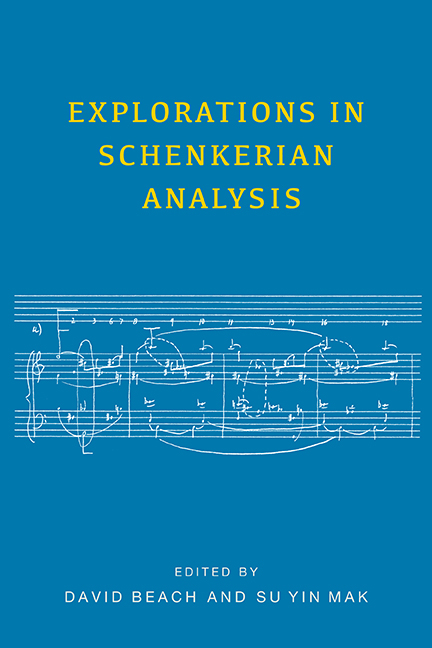Preface
Published online by Cambridge University Press: 28 June 2018
Summary
Explorations in Schenkerian Analysis is a collection of essays written in memory of Edward Laufer (1938–2014), a prominent proponent of Schenkerian analysis, by former colleagues, friends, and students. Edward's introduction to Schenker came in a seminar taught by Ernst Oster at Princeton, where Edward was enrolled in the doctoral program in composition and theory. Prior to his studies at Princeton, he had completed a master's degree in composition at the University of Toronto and attended the Juilliard School of Music, where he studied composition with Roger Sessions, a major influence on his development, and piano with Edward Steuermann. At Princeton, he worked closely with several teachers, including Milton Babbitt, who was the advisor of his doctoral dissertation on Schoenberg's Four Songs, op. 22. Why he never submitted this last requirement for the PhD degree remains a mystery to his friends. Perhaps the reason lies in the disappointing reception of his paper on this topic at the AMS meeting in 1973, or perhaps his interest had shifted elsewhere by that time; or perhaps he simply would not put into print work about which he was not totally convinced—a characteristic trait that was to inform his approach to publication throughout his entire career. After all, Edward was a perfectionist. He devoted the utmost attention and respect to the music under study, and he expected the same level of care from others. Whatever the reason, clearly the pivotal event that shaped Edward's future was that seminar with Oster, with whom Edward continued to study privately until Oster's death in 1977. The rest is history; Edward Laufer became a leading advocate and practitioner of Schenkerian analysis in his generation.
For those who did not know him personally, Edward is probably best known for the voluminous handouts accompanying his conference presentations, which reveal not only his superior grasp of the literature, but also a mind-set, akin to Schenker's, that a broad view is necessary. Those who have had the privilege of working with him can additionally testify to his outstanding musicianship, intellectual elegance, and an old-school humanism that encompassed all aspects of culture. For thirty years (1974–2004) he taught at the University of Toronto.
- Type
- Chapter
- Information
- Explorations in Schenkerian Analysis , pp. vii - xiiPublisher: Boydell & BrewerPrint publication year: 2016

